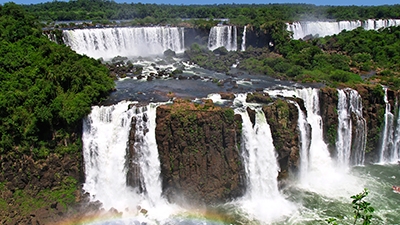Seminar 1
Boris E. Utria
Country Operations Adviser & Head of Office
World Bank Group
Brasilia, Brazil
Boris E. Utria began his career at the World Bank in 1988. In August 2010 took over as Country Operations Advisor for the World Bank in Brazil. Among several other functions of his current position, he is responsible for managing the investment pipeline and portfolio of the World Bank in Brazil, managing the Country Office in Brasilia and is the Country Focal Point for South-South Cooperation and Gender Development in Brazil. Prior to assuming this position, Mr. Utria held various other senior positions at the World Bank, in the field and in Washington DC, including, Acting Country Director for Mozambique, Angola, Malawi, Zambia and Zimbabwe (AFMMZ), Acting Country Manager AFMMZ, Sector Leader for Sustainable Development for AFMMZ, Leader of the Thematic Group on Energy and Poverty of the World Bank, Regional Program Manager for Renewable Energy for Africa (RPTES – a World Bank-DGIS Program,), and Senior Economist at the Energy Unit for Africa.
Before joining the Bank Mr. Utria worked as Senior Regional Planner at the Department of Regional Development of the Organization of American States (OAS) from 1982 to 1988. Mr. Utria began his professional career as Research Associate at the Center for Technology PROMON (Rio de Janeiro), and has Masters Degrees in Agricultural Economics and Regional Planning from the University of Guelph, Canada, and a B.A. Honors in Economics from the Catholic University of Rio de Janeiro (PUC-RJ).
Thadeu Abicalil
Senior Water and Sanitation Specialist
World Bank Group
Brasilia, Brazil
Mr. Abicalil, a Brazilian national, joined the Bank in 2007 as Senior Water and Sanitation Specialist. He has been working extensively in the Brazil water, sanitation and urban portfolios, leading several investment and policy development lending operations to federal, state and municipal institutions. He participated in the development of the joint World Bank and IFC Subnational Finance loans to subnational water and sanitation utilities, and has contributed to Bank financed projects and technical assistance in water and urban development in the Africa and Asia regions. He is also known for his expertise on issues such as subsidies, regulation and local economic development, and being a key participant in the country's sector dialogues.
Prior to his arrival at the World Bank, Mr. Abicalil worked as Senior Adviser for the Brazilian Association of State Water and Sanitation Utilities (AESBE) and as the coordinator of the Federal Water Sector Modernization Program, a program that combined TA at federal level and subnational levels and investments for 3 state utilities. Prior to those assignments, he was the senior advisor for the National Secretary for Urban Development. At the local government level, he worked for the Municipality of Angra dos Reis as Municipal Secretary for Works and Public Services leading the water supply and sanitation services. He has also worked at the IDB, UNDP and CEPAL in Brazil and in Uruguay, Mexico and India. His degrees are in Architecture and Urban Development from the Federal University of Rio de Janeiro.
Rosa Maria Formiga Johnsson
Adjunct Professor at the Universidade do Estado do Rio de Janeiro – UERJ (Department of Sanitation Engineering and the Environment)
Director of the Water and Land Management at the Institute for the
Environment (INEA) in Rio de Janeiro
Ms. Formiga-Johnsson graduated in Civil Engineering in 1987 from the Universidade Federal de Goiás. She obtained her Masters (1992) and Doctorate in Environmental Sciences from the Université de Paris XII, France. Currently, she is an Adjunct Professor at the Universidade do Estado do Rio de Janeiro – UERJ (Department of Sanitation Engineering and the Environment) and the Director of the Water and Land Management at the Institute for the Environment (INEA) in Rio de Janeiro. Ms. Formiga-Johnsson has also been involved in the areas of policy, planning and water management, management of hydrographic basins, hydric resource economics, environmental management, land management, disaster risk management and climate global change/vulnerability and adaptation.
Ede Jorge Ijjász-Vásquez
Director for Sustainable Development, Latin American and the Caribbean Region
World Bank Group
Washington, DC
Ede Jorge Ijjász-Vasquez is the Director for Sustainable Development of the Latin America and Caribbean Region, covering the areas of infrastructure (transport, energy, water supply and sanitation, and other municipal services), environment and climate change, social development, agriculture and rural development, disaster risk management, and urban development. The Sustainable Development Department of the LAC region has a diversified active portfolio of about $17 billion.
Prior to this position, Mr. Ijjász was the Sector Manager of the Sustainable Development Unit for China and Mongolia and was located in Beijing, China. Mr. Ijjasz was also the manager of the Water and Sanitation Program (WSP) and the Energy Sector Management Assistance Program (ESMAP). WSP and ESMAP are two of the longest-running global trust-funded trust fund partnership programs administered by the World Bank, supporting technical assistance and capacity building activities in the water, sanitation and energy sectors.
Earlier in his career at the World Bank, Mr. Ijjász was a Senior Water and Sanitation Specialist with the World Bank’s Europe and Central Asia region, and program team leader for water and sanitation projects in Central Asia, the Caucuses and the Russian Federation.
Mr. Ijjász is currently a lecturer with the Environmental Science and Policy Master’s Program of the Johns Hopkins University in contaminant fate and transport modeling and policy. While living in Beijing, he also taught a course in Sustainable Development at Tsinghua University in Beijing.
He holds a Ph.D. and a M.Sc. from the Massachusetts Institute of Technology (MIT) in civil and environmental engineering, with specialization in hydrology and water resources. He has several publications in civil engineering, physics and geomorphology scientific journals. His most recent book is on Sustainable Low-Carbon City Development in China.
